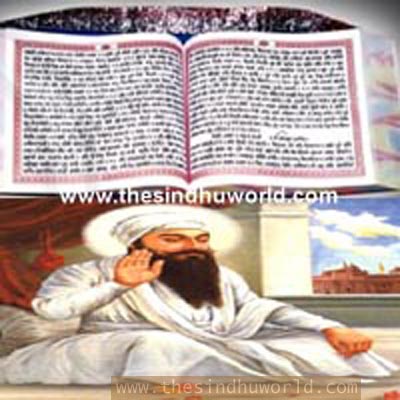Adi Pothi
Adi Pothi - Kiratpur Bir

GURU ARJUN NE EK NAYA JAHAJ BANAIYA HAI
KALYUG KO TARAN GURU GRANTH LIKHAIYA HAI
Adi Pothi & Guru Arjun Devi Ji
In the year 1604 Guru Arjun Dev Ji compiled the divine Gurbani of Sikh Gurus starting with Sri Guru Nanak Dev ji in the written format. Baba Srichand [Son of Guru Nanak], Baba Dattu [son of Guru Angad], and Baba Mohan [son of Guru Amardas] were requested for the original scripts of Gurus and work was started in the city of Amritsar. This written format of Banis of Gurus was named as “Adi Pothi” [presently pronounced as “Kiratpur Bir” of Guru Granth]. Majority of Shabads, Banis, Saloks, and Poudis are in the Punjabi dialect and are written in Gurmukhi [Punjabi] script but somehow a bit of effect of Persian, Hindi, Marathi, Sanskrit and Arabic languages is visible. Banis of Sikh Gurus are the main composition of Sri Guru Granth but still a good considerable part is from the compositions of Hindu Bhagat, Muslim Divine scholars, Sufi poets and other God intoxicated soul from the era between 12th and 17th century and various geographical regions of India.
Four Major Parts of Adi Pothi
Guru Arjun Dev Ji arranged all Gurbani on the basis of traditional ragas of Indian classical music instead of subject and divided Adi Pothi in four major parts:
1] Banis of Nitnem
Japji [Morning prayer Page 1 To 8]
Raheras [Evening prayer “So Dar” &”SO Purakh” Page 8 To 12]
Sohila [Bed time prayer Page 12 To 13].
2] Banis in Raga
This comprise major portion of Sri Guru Granth. The list of initial thirty ragas included by Guru Arjun Dev Sahib goes like: –
[01] Sri Rag [02] Manjh [03] Gauri (Gaudi) [04] Asa [05] Gujari [06] Devgandhari [07] Bihadara [08] Wadhans [09] Sorath [10] Dhanasari [11] Jaitsari [12] Todi [13] Bairari [14] Tilang [15] Suhi [16] Bilaval [17] Gaund [18] Ramkali [19] Nat [20] Maligaura [21] Maru [22] Tuhari [23] Kedara [24] Bhairav [25] Basant [26] Sarang [27] Malar [28] Kanara [29] Kalian [30] Prabhati.
When in 1705 Dasham Pitah Guru Gobind Singh Ji recomposed “Guru Granth” they included Compositions of the Bhagats and raga Jaijawanti [with only compositions of Guru Teg Bahadur Ji] as [31] raga. Ragas are further divided into
Choupada [average of four verses each]
Ashtpadi [average of eight verses]
Chhants [six-line verses]
Vars [composed of two or more sloks]
Poudi [concluding stanza].
Each Raga starts with composition from any of Sikh Guru and ends with the Bani from the Bhagat.
3] Banis not in a specific Raga Sloks of Bhagat Kabir and Bhagat baba Shaikh Farid along with “Swayas” of Guru Arjun and Bhatts [Musicians of Guru Darbar
4] The remaining sloks &” Mudhavanee” composition of Guru Arjun along with “Ragmala” (the list of ragas) are compromising this part of Adi Pothi.
Order of Hymns in Sri Guru Granth Sahib
The Hymns of Sri Guru Granth Sahib have been laid out in a very scientific and well-planned manner. Banis are arranged in order of Guru Nanak, Guru Amardas, Guru Ramdas & Guru Arjun. Sloks of second Sikh Guru – Guru Angad are kept in Vars. Bhagat Banis are following Gurbani.
In the Guru Granth Sahib Banis of following fifteen Bhagat are included.
[01] Bhagat Kabir [02] Bhagat Namdev [03] Bhagat Trilochand [04] Bhagat Jaidev [05] Bhagat Shaikh Farid [06] Bhagat sadhana [07] Bhagat Beni [08] Bhagat Ramchand [09] Bhagat Ravidas [10] Bhagat Peepa [11] Bhagat Sain [12] Bhagat Dhana [13] Bhagat Bikhan [14] Bhagat Parmanand [15] Bhagat Surdas.
Besides the hymns of Bhai Mardana & Baba Sunder, “Swayas” of eleven Bhatts namely
[1] Kal Sahar [2] Jalap [3] Kirat [4] Bhikha [5] Sal [6] Bhal [7] Nal [8] Gayand [9] Mathura [10] Bal & [11] Harbans are also included in Sri Guru Granth.
Adi Pothi - Harmandir [Golden temple] Amritsar
In the August 1604 “Pothi Sahib” installed at “Harmandir” [Golden Temple], Baba Buddha Ji were appointed as the first Granthy [ Custodian]. During this ceremony Guru Arjun Dev Ji were seated at lower level and asked all the devotees to bow before Pothi Sahib, Indicating future importance of this for the Sikhism in the future.
